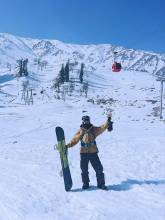Going Backcountry Camping - Guide to Prepare
Heading out on a camping trip is always a great idea, especially if you’re a person who enjoys spending time in the wild, with an abundance of fresh air and minimal distractions. That being said, a backcountry camping trip especially if it’s your first time can be daunting and does require a bit of preparation. If you’re interested in doing it, here are five tips to help you prepare.
Pack the Right Overnight Gear
When you’re going backcountry camping, the right gear can make or break your entire experience. The first thing you want to grab is a high-quality down backpacking sleeping bag. The down option ensures a warm and comfortable sleep, however, make sure you pick the right temperature rating that suits the environment and temperature you’ll be camping in. And here’s a tip – choose a temperature rating that’s intended for a colder night than the lowest expected temperature on your trip. That way, if things get cold, you should be covered.
A tent is the other big thing to pack, and you want one that provides suitable shelter and wind protection. When you’re backcountry camping, chances are the closest shelter of any kind won’t exactly be close, so you want a quality tent that’ll keep you warm overnight.

Anything Else to Pack?
Yes, a backpack and a lamp. These aren’t exactly overnight gear, but they’re still things you must have. Choose a backpack that will fit everything you plan on bringing along, but make sure it’s one with suitable weight distribution. This will ensure that you don’t have any pressure points on your back when you’ve filled up the backpack with everything you’re carrying, and instead, things will be as comfortable as possible.
When picking a lamp, our suggestion would be to go for a headlamp. Yes, handheld flashlights might be more powerful in some instances, but they require a hand for operation (or some other methods that aren’t too comfortable). On the other hand, a headlamp will keep both hands free, and will always remain pointed in the direction your head is turned in. Just pick a good one.
To wrap things up in terms of gear, you should also make sure to bring any food items you’ll need to prepare the food you’re bringing. This includes cutlery, a portable stove, and anything else you might think you need.
Plan in Advance
The most important thing, and probably the first step of the way, is to have everything planned out early and well in advance. And while some suggest picking the locations first, we say pick the dates first. Picking the dates that suit you will somewhat limit you in terms of which locations you can head out to, as not all of them will be available during the dates you’ve chosen. It’s also worth it to be flexible with the dates because if the weather changes or something else happens unexpectedly, you’ll be covered.
A thing to keep in mind is that if your backcountry camping trip has a point A to point B hiking experience, you’ll need someone that will drop you off at the starting point and pick you up at the end – make sure there’s a person available during the dates you’ve chosen.
Once you’ve found a date that suits you, see what locations are available and worth visiting. Pick the one you like best, and see whether or not there are suitable places for you to set up camp. Also, you might want to see whether or not the trails you’ll need to hike to get to your destination are something you’re comfortable with. And on that note …
Be Physically Prepared
This is another thing you will need to start working on well in advance, especially if you’re not that prepared at the moment. Try to implement some breathing exercises in your daily routine, and do stretches often. This will help with your overall movement, and those breathing exercises will improve your lung capacity so you don’t run out of breath after the first 20 minutes of hiking.
While we’re at it, it’s worth mentioning that if this is your first time you shouldn’t overestimate yourself. Pick a trail and destination you’ll definitely be able to conquer and make sure you’ll have enough energy to set up camp once you reach your destination. That’s demanding, too, and you don’t want to fall asleep with your tent set up halfway.

Grab a Permit!
One of the beauties of backcountry camping is that you aren’t sharing an overcrowded campsite with others, but if you’re heading to a national park, you probably still need a permit. They’re usually free, but make sure you grab yours from the info booth at the park’s entrance, or even better, get one online – they should be available on the national parks’ websites.













